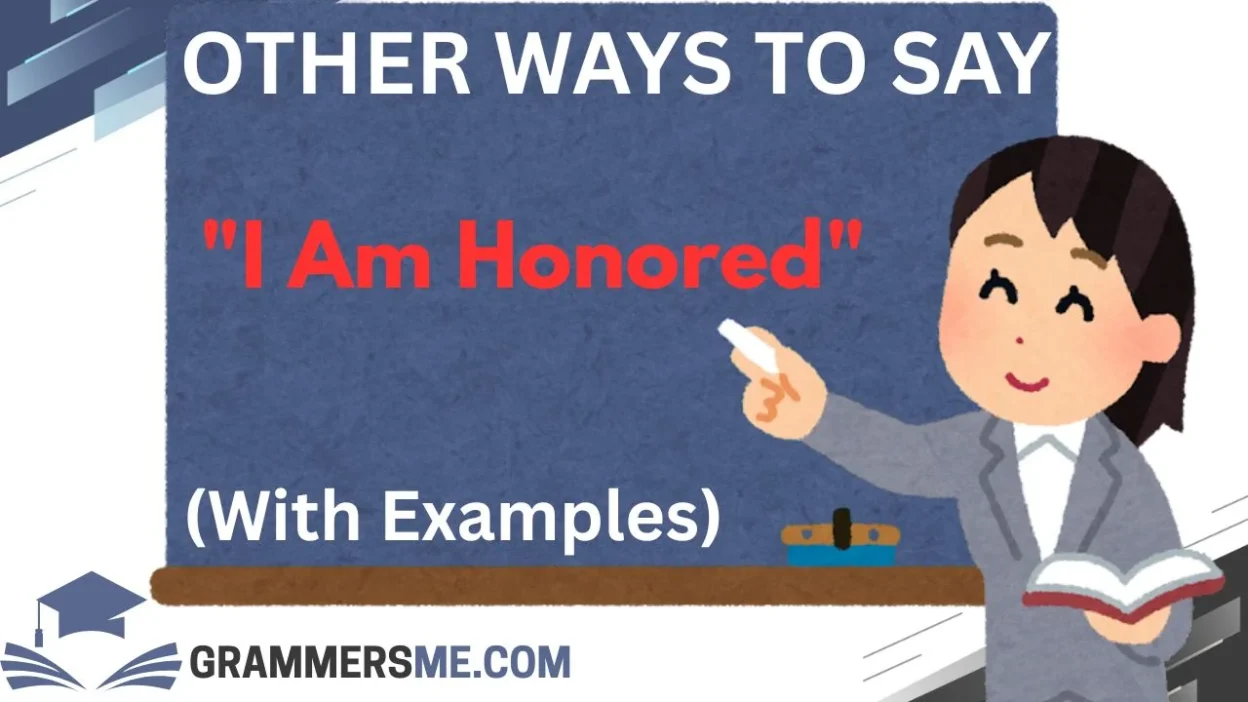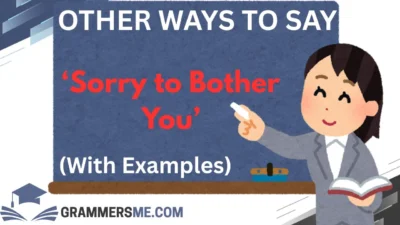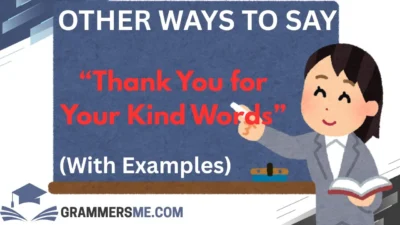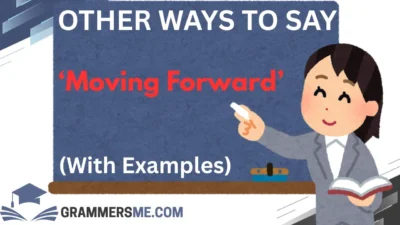Expressing gratitude and appreciation in a thoughtful way is essential in creating meaningful connections. The phrase “I am honored” is one we use when we want to show respect or acknowledge a special privilege, but there are so many other ways to express this sentiment. By expanding your vocabulary, you can add depth to your communication, making your words feel more personal, warm, and genuine.
This article will explore 30 alternative ways to say “I am honored,” offering examples and advice on how to use each phrase to best convey your feelings.
What Does “I Am Honored” Mean?
“I am honored” is an expression of appreciation, respect, or humility in response to something meaningful or important. It is commonly used when someone feels privileged, proud, or grateful for an opportunity, recognition, or the chance to participate in something significant. Essentially, it conveys the idea of receiving something valuable and acknowledging the privilege.
Is It Professional/Polite to Say “I Am Honored”?
Yes, “I am honored” is both professional and polite in many situations, especially in formal contexts or when expressing gratitude for an important opportunity. It’s a great way to acknowledge someone’s generosity or a prestigious occasion, while conveying both respect and appreciation. However, depending on the formality of the situation, sometimes using more casual or slightly different expressions might feel more fitting.
1. “I Feel Privileged”
Meaning: To feel that you are in a fortunate or blessed position.
Detailed Explanation: When you say, “I feel privileged,” you’re expressing a sense of personal fortune, as though you’re receiving something that few others might have the chance to experience.
Scenario Example: “I feel privileged to be part of this wonderful project alongside such talented individuals.”
Best Use: When you want to express gratitude for an exclusive opportunity or an exceptional circumstance.
Not Use: In casual, everyday interactions where the situation isn’t particularly special or significant.
2. “I Am Truly Grateful”
Meaning: A heartfelt expression of thanks, showing deep appreciation.
Detailed Explanation: Saying “I am truly grateful” shows that you are not just appreciative but deeply moved by the gesture, opportunity, or recognition.
Scenario Example: “I am truly grateful for your kind invitation to speak at this event.”
Best Use: In both professional and personal contexts when you want to show sincere appreciation.
Not Use: In a situation where a lighthearted or informal tone is more appropriate.
3. “I Am Deeply Honored”
Meaning: A more profound or intense version of “I am honored,” suggesting deep respect or gratitude.
Detailed Explanation: This expression communicates not only a feeling of honor but also a deeper level of emotional engagement with the situation.
Scenario Example: “I am deeply honored to accept this award on behalf of my team.”
Best Use: In formal settings or when acknowledging a significant achievement or recognition.
Not Use: In casual or less emotionally significant situations.
4. “I Appreciate This Immensely”
Meaning: To show a great deal of appreciation, often with a sense of depth or intensity.
Detailed Explanation: This phrase highlights the level of gratitude you feel, making it clear that you don’t take the gesture or opportunity for granted.
Scenario Example: “I appreciate this immensely; it means so much to me.”
Best Use: When you want to express a high level of gratitude in both formal and informal contexts.
Not Use: When the gesture is small or minor and doesn’t warrant such a strong response.
5. “It’s a Privilege to Be Here”
Meaning: A humble expression that conveys respect for an opportunity or experience.
Detailed Explanation: This expression goes beyond mere appreciation—it reflects the recognition that being in a certain situation or position is a privilege in itself.
Scenario Example: “It’s a privilege to be here today with all of you.”
Best Use: In professional settings or when speaking to a group, especially when acknowledging your good fortune.
Not Use: In casual, informal conversations where a simpler form of gratitude is more appropriate.
6. “I Am Flattered”
Meaning: Acknowledging that you feel pleased or humbled by a compliment or recognition.
Detailed Explanation: “I am flattered” is often used in response to a compliment, showing that you’re not only grateful but also touched by the recognition.
Scenario Example: “I’m flattered by your kind words; they mean a lot to me.”
Best Use: When someone compliments you or gives you special attention.
Not Use: In situations where the recognition is not particularly personal or meaningful.
7. “This Means a Great Deal to Me”
Meaning: An expression that conveys that something has significant emotional value.
Detailed Explanation: When you say “this means a great deal to me,” you emphasize that the opportunity, recognition, or gesture holds a high level of importance in your life.
Scenario Example: “This means a great deal to me. Thank you for considering me for this position.”
Best Use: In both personal and professional contexts when you want to show that something is deeply meaningful.
Not Use: For casual or everyday gestures that don’t hold much significance.
8. “I’m Truly Honored”
Meaning: An alternative way to express that you feel a sense of privilege or appreciation.
Detailed Explanation: Similar to “I am honored,” this phrase carries a more personal touch, often used when you want to express deep sincerity.
Scenario Example: “I’m truly honored to be selected for this role.”
Best Use: In formal or semi-formal settings where sincerity and respect are key.
Not Use: In casual or lighthearted conversations where a simpler phrase would work better.
9. “I Am Humbled”
Meaning: To acknowledge a sense of modesty or humility in receiving recognition or an opportunity.
Detailed Explanation: Saying “I am humbled” reflects the understanding that the honor or opportunity is not something you take for granted, and you feel a bit modest about it.
Scenario Example: “I am humbled by this recognition. Thank you for your trust in me.”
Best Use: When you want to show humility and deep respect.
Not Use: If you want to avoid sounding overly modest or when the occasion doesn’t require such humility.
10. “I Can’t Thank You Enough”
Meaning: A way to express deep and heartfelt gratitude that goes beyond words.
Detailed Explanation: This phrase communicates that your gratitude is so profound that words alone can’t fully convey it.
Scenario Example: “I can’t thank you enough for all your support throughout this process.”
Best Use: When you are deeply appreciative and want to convey that sentiment strongly.
Not Use: For minor gestures or when the situation calls for a more reserved response.
11. “I’m Grateful Beyond Words”
Meaning: An expression to indicate that words alone cannot fully convey your level of gratitude.
Detailed Explanation: When you say “I’m grateful beyond words,” you’re emphasizing that your thankfulness goes beyond what can be captured in speech. It shows deep appreciation that feels almost indescribable.
Scenario Example: “I’m grateful beyond words for all the help you’ve given me with this project.”
Best Use: When you’re moved by a gesture or recognition that feels profound and beyond what you can express verbally.
Not Use: When the gesture is relatively small or insignificant.
12. “I Am Touched”
Meaning: A way to express that you are emotionally moved or affected by a gesture or action.
Detailed Explanation: “I am touched” suggests a deep emotional response, acknowledging that the gesture or action has affected you in a meaningful way.
Scenario Example: “I am truly touched by your kind words and support.”
Best Use: When you want to express that you’ve been moved by someone’s thoughtfulness or generosity.
Not Use: For situations where you don’t feel emotionally affected or if the moment isn’t particularly special.
13. “It’s an Honor”
Meaning: A concise way to acknowledge that you appreciate the opportunity or recognition.
Detailed Explanation: This phrase is often used in more formal settings to convey respect and appreciation without being overly emotional.
Scenario Example: “It’s an honor to be invited to speak at this conference.”
Best Use: In professional settings where you want to maintain formality while showing respect.
Not Use: In informal or personal situations, where a more casual expression might feel more fitting.
14. “I Am Thankful”
Meaning: A simple, direct way to express gratitude.
Detailed Explanation: “I am thankful” is a straightforward way to acknowledge your appreciation, without adding too much formality or intensity.
Scenario Example: “I am thankful for this opportunity to work with such an incredible team.”
Best Use: In both casual and professional settings when you want to express appreciation clearly.
Not Use: In highly formal situations where a more elegant expression might be needed.
15. “I Feel Blessed”
Meaning: To express that you feel fortunate and grateful, often used in a more spiritual or personal context.
Detailed Explanation: “I feel blessed” communicates a sense of being fortunate and grateful for something or someone. It can also imply that you see the experience as a gift.
Scenario Example: “I feel blessed to have such supportive colleagues.”
Best Use: In both personal and professional contexts, particularly when you want to convey a deeper sense of appreciation and gratitude.
Not Use: If you don’t feel the situation is deeply impactful or when a simpler phrase would suffice.
16. “I Am Overwhelmed With Gratitude”
Meaning: An expression to show that your gratitude is so strong, it feels almost overpowering.
Detailed Explanation: This phrase indicates that you are deeply moved by a gesture or opportunity, and the level of gratitude you feel is immense.
Scenario Example: “I am overwhelmed with gratitude for everything you’ve done for me.”
Best Use: When you feel incredibly thankful and want to emphasize the depth of your emotion.
Not Use: When the situation doesn’t warrant such an intense response.
17. “I Appreciate This With All My Heart”
Meaning: A heartfelt expression of appreciation, often used to show deep and genuine gratitude.
Detailed Explanation: This phrase conveys that your appreciation comes from a very sincere and deep place.
Scenario Example: “I appreciate this with all my heart. You’ve really made my day.”
Best Use: In personal settings or when you want to show deep affection and genuine gratitude.
Not Use: In professional settings, where such a personal tone might feel too informal.
18. “I Feel Lucky”
Meaning: To express that you are fortunate or lucky to be in a certain position or to receive a certain benefit.
Detailed Explanation: “I feel lucky” communicates that you recognize the opportunity or recognition as something you cherish and consider fortunate.
Scenario Example: “I feel lucky to have the chance to learn from such experienced mentors.”
Best Use: In both professional and casual settings when you want to express appreciation while acknowledging good fortune.
Not Use: In situations where the focus should be on professional accomplishment rather than good luck.
19. “I Am Most Grateful”
Meaning: A polite and somewhat formal expression of gratitude.
Detailed Explanation: This phrase emphasizes the depth of your gratitude, often used in formal situations or written communication.
Scenario Example: “I am most grateful for your support during this challenging time.”
Best Use: In formal contexts, such as business letters or professional emails, when you want to show deep appreciation.
Not Use: In very casual situations where a more informal phrase would be more suitable.
20. “It’s a Privilege to Serve”
Meaning: A way to express honor and respect in the context of service or assistance.
Detailed Explanation: “It’s a privilege to serve” conveys that you consider the act of helping or serving others as an honor, recognizing the importance of the task.
Scenario Example: “It’s a privilege to serve as your mentor and guide.”
Best Use: In leadership or mentorship roles, when you want to convey humility and honor in serving others.
Not Use: In casual or non-formal situations, where a simpler expression of gratitude would suffice.
21. “I’m Truly Moved”
Meaning: To express that you are emotionally affected or touched by a gesture or recognition.
Detailed Explanation: This phrase communicates that the action or recognition has affected you deeply, moving you emotionally.
Scenario Example: “I’m truly moved by your generosity and support.”
Best Use: When responding to a meaningful or emotionally significant gesture.
Not Use: If the gesture isn’t particularly emotional or impactful.
22. “I Feel Deeply Honored”
Meaning: To express a strong sense of privilege and respect for a particular recognition or opportunity.
Detailed Explanation: This phrase emphasizes a profound level of appreciation and the depth of your recognition for an honor.
Scenario Example: “I feel deeply honored to have been selected for this prestigious award.”
Best Use: In formal and highly significant situations where you want to emphasize your deep respect and gratitude.
Not Use: For everyday or less significant occasions.
23. “I Am Grateful for This Opportunity”
Meaning: To express thanks for the chance to participate in or benefit from something significant.
Detailed Explanation: This phrase conveys appreciation for the chance to engage in something valuable or important, especially in a professional context.
Scenario Example: “I am grateful for this opportunity to work with such a talented team.”
Best Use: In professional contexts, when acknowledging a chance to collaborate, contribute, or learn.
Not Use: In casual conversations where the opportunity is not significant enough to warrant such formality.
24. “I Am Honored to Be Part of This”
Meaning: A humble way to acknowledge your inclusion in something significant.
Detailed Explanation: This phrase conveys gratitude and respect for being included in a group or project, acknowledging the privilege it is to participate.
Scenario Example: “I am honored to be part of this groundbreaking research team.”
Best Use: When you want to acknowledge your role in something important, particularly in professional or formal settings.
Not Use: When the situation or inclusion is not particularly significant or impactful.
25. “I Am Grateful for Your Kindness”
Meaning: To express appreciation for someone’s kindness or generosity.
Detailed Explanation: This phrase focuses on recognizing the generosity or kindness of someone, showing deep appreciation for their actions.
Scenario Example: “I am grateful for your kindness in helping me during this tough time.”
Best Use: When acknowledging acts of kindness, especially in personal interactions.
Not Use: For formal business situations where a more neutral or professional tone is preferred.
26. “I Am Truly Privileged”
Meaning: To acknowledge that you are grateful for being given a special opportunity, often with a sense of humility.
Detailed Explanation: This expression emphasizes the feeling of being fortunate and honored in a way that reflects both appreciation and humility.
Scenario Example: “I am truly privileged to be working alongside such talented colleagues.”
Best Use: When you want to acknowledge the significance of a role or position and express gratitude for the opportunity, especially in a professional context.
Not Use: In casual or informal settings where a simpler form of gratitude is more appropriate.
27. “I Am Blessed to Have This Opportunity”
Meaning: To express that you feel fortunate and grateful for the chance to participate in something significant.
Detailed Explanation: “I am blessed to have this opportunity” emphasizes a deeper sense of gratitude, often conveying the feeling that the opportunity is a gift.
Scenario Example: “I am blessed to have this opportunity to contribute to such an important cause.”
Best Use: When you want to express a deep sense of appreciation for something you consider a great privilege.
Not Use: In professional environments where a more neutral or formal expression might be more appropriate.
28. “I Appreciate the Recognition”
Meaning: A way of expressing thanks for being acknowledged or honored.
Detailed Explanation: This phrase conveys gratitude specifically for recognition or praise, without overstating the emotion involved.
Scenario Example: “I appreciate the recognition you’ve given me. It truly motivates me to keep pushing forward.”
Best Use: When you are being recognized for your work or efforts, and you want to acknowledge the gesture politely.
Not Use: In situations where the recognition is not particularly significant, as it may feel overly formal for small gestures.
29. “I Am Full of Gratitude”
Meaning: To express that your heart is overflowing with appreciation.
Detailed Explanation: This phrase indicates that you feel an abundance of gratitude, showing that the act or gesture has deeply impacted you.
Scenario Example: “I am full of gratitude for everything you’ve done for me during this challenging period.”
Best Use: In heartfelt situations when you want to show deep emotional appreciation.
Not Use: In professional or formal settings unless the context is especially personal or emotional.
30. “I Am Deeply Moved”
Meaning: To indicate that you are emotionally affected by a gesture, recognition, or act of kindness.
Detailed Explanation: “I am deeply moved” expresses a strong emotional response, showing that the action has had a meaningful impact on you.
Scenario Example: “I am deeply moved by your support and encouragement throughout this journey.”
Best Use: When responding to a thoughtful or emotional gesture, especially in personal or sensitive situations.
Not Use: In casual or business-related contexts where a more neutral or formal expression might be preferred.
Conclusion
There are countless ways to express the sentiment of being “honored,” and the 30 alternatives shared in this article offer you a broad range of options to choose from. Whether you’re expressing deep gratitude in a professional setting, responding to recognition, or simply acknowledging a kind gesture, these phrases help you communicate warmth, sincerity, and respect. By carefully selecting the words that best align with your emotions and the context of the situation, you ensure that your message is not only heard but felt.
Remember, the key to effective communication is authenticity. By using these alternative expressions thoughtfully, you can add a personal touch to your gratitude and appreciation, deepening the connection with those around you.
Frequently Asked Questions (FAQs)
1. How do I decide which phrase to use?
The best way to decide is by considering the context. If the occasion is formal, go for expressions like “I am deeply honored” or “I am truly privileged.” For more personal or casual interactions, phrases like “I’m grateful beyond words” or “I feel lucky” might feel more fitting.
2. Is it okay to use these phrases in everyday conversation?
Absolutely! Some of these phrases, like “I am grateful” or “I feel lucky,” can work perfectly in everyday conversation. The key is to match the phrase to the level of appreciation and the formality of the situation.
3. Can I use these phrases in both written and spoken communication?
Yes, these phrases can be used both in speech and in writing, but for written communication, be mindful of the tone of your message. For example, “I am truly grateful” can be a great fit for a thank-you letter, while “I feel blessed” might feel more at home in a personal message.
4. Are some of these alternatives more formal than others?
Yes, phrases like “I am deeply honored” and “It’s a privilege to serve” tend to be more formal, making them ideal for professional settings. Others, like “I’m grateful beyond words” or “I feel lucky,” may be better suited for personal, informal contexts.
5. Do I need to use one of these alternatives every time I want to express appreciation?
Not at all! While it’s wonderful to have a variety of expressions at your disposal, you can simply say “thank you” when it feels most natural. The goal is to add a personal touch when appropriate, but there’s no need to overcomplicate your expressions of gratitude.




